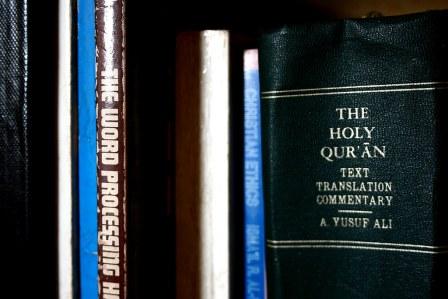The Holy Quran, revealed to Prophet Muhammad (PBUH), is a timeless guide for humanity, offering wisdom, hope, and direction for every aspect of life. Its verses touch the heart, inspire action, and provide clarity in times of confusion. For Muslims and those exploring Islam, the Quran and authentic Hadith offer practical and spiritual tools to transform lives. We explore 15 powerful Quran verses, supported by Sahih Hadith, to guide you toward a life of purpose, resilience, and closeness to Allah (SWT). Whether you seek spiritual growth, strength in trials, or a deeper connection with faith, these verses can light your path. Let’s dive into this journey of transformation, reflecting on how these divine words can shape our lives.
1. Seeking Guidance Through Faith
The Quran begins with a powerful prayer for guidance in Surah Al-Fatihah, Ayah 6-7:
ٱهۡدِنَا ٱلصِّرَ ٰطَ ٱلۡمُسۡتَقِیمَ
Guide us to the straight path –
[1:6]
صِرَ ٰطَ ٱلَّذِینَ أَنۡعَمۡتَ عَلَیۡهِمۡ غَیۡرِ ٱلۡمَغۡضُوبِ عَلَیۡهِمۡ وَلَا ٱلضَّاۤلِّینَ
The path of those upon whom You have bestowed favor, not of those who have evoked [Your] anger or of those who are astray.
[1:7]
This verse, recited in every unit of Salah (prayer), reminds us to seek Allah’s guidance constantly. It teaches humility and dependence on Allah (SWT) for direction in life’s challenges. A Hadith in Sahih Muslim (Book 4, Hadith 169) emphasizes the importance of Al-Fatihah, with the Prophet (PBUH) calling it the “Mother of the Quran.” Reflect: Are you sincerely asking Allah (SWT) to guide your decisions daily?
2. Finding Strength in Patience and Prayer
Life’s trials test our resilience, but Surah Al-Baqarah, Ayah 153 offers solace:
یَـٰۤأَیُّهَا ٱلَّذِینَ ءَامَنُوا۟ ٱسۡتَعِینُوا۟ بِٱلصَّبۡرِ وَٱلصَّلَوٰةِۚ إِنَّ ٱللَّهَ مَعَ ٱلصَّـٰبِرِینَ
O you who have believed, seek help through patience and prayer. Indeed, Allah is with the patient.
[2:153]
This verse teaches that patience (sabr) and prayer (salah) are tools to navigate hardships. The Prophet (PBUH) exemplified this, as narrated in Sahih Bukhari (Book 23, Hadith 389), where he turned to prayer during distress. For example, when facing financial stress or loss, combine patience with regular Salah to find peace. How can you incorporate these into your daily struggles?
3. Trusting Allah’s Plan
In times of uncertainty, Surah Al-Baqarah, Ayah 216 reassures us:
كُتِبَ عَلَیۡكُمُ ٱلۡقِتَالُ وَهُوَ كُرۡهࣱ لَّكُمۡۖ وَعَسَىٰۤ أَن تَكۡرَهُوا۟ شَیۡـࣰٔا وَهُوَ خَیۡرࣱ لَّكُمۡۖ وَعَسَىٰۤ أَن تُحِبُّوا۟ شَیۡـࣰٔا وَهُوَ شَرࣱّ لَّكُمۡۚ وَٱللَّهُ یَعۡلَمُ وَأَنتُمۡ لَا تَعۡلَمُونَ
Fighting has been enjoined upon you while it is hateful to you. But perhaps you hate a thing and it is good for you; and perhaps you love a thing and it is bad for you. And Allah Knows, while you know not.
[2:216]
This verse reminds us that Allah’s wisdom surpasses our understanding. A Hadith in Sunan Ibn Majah (Book 1, Hadith 79) narrates that the Prophet (PBUH) said, “How wonderful is the affair of the believer, for all his affairs are good.” Reflect on a time when a setback led to unexpected blessings—how did it strengthen your trust in Allah (SWT)?
4. The Power of Repentance
Repentance renews our connection with Allah (SWT). Surah Az-Zumar, Ayah 53 encourages us:
۞ قُلۡ یَـٰعِبَادِیَ ٱلَّذِینَ أَسۡرَفُوا۟ عَلَىٰۤ أَنفُسِهِمۡ لَا تَقۡنَطُوا۟ مِن رَّحۡمَةِ ٱللَّهِۚ إِنَّ ٱللَّهَ یَغۡفِرُ ٱلذُّنُوبَ جَمِیعًاۚ إِنَّهُۥ هُوَ ٱلۡغَفُورُ ٱلرَّحِیمُ
Say, “O My servants who have transgressed against themselves [by sinning], do not despair of the mercy of Allah. Indeed, Allah forgives all sins. Indeed, it is He who is the Forgiving, the Merciful.”
[39:53]
This verse highlights Allah’s boundless mercy. A Hadith in Sahih Muslim (Book 37, Hadith 6644) states that Allah (SWT) accepts repentance as long as death is not near. Consider a mistake you regret—how can sincere repentance transform your heart and actions?
5. Gratitude Transforms Perspective
Gratitude shifts our focus to blessings. Surah Ibrahim, Ayah 7 states:
وَإِذۡ تَأَذَّنَ رَبُّكُمۡ لَىِٕن شَكَرۡتُمۡ لَأَزِیدَنَّكُمۡۖ وَلَىِٕن كَفَرۡتُمۡ إِنَّ عَذَابِی لَشَدِیدࣱ
And [remember] when your Lord proclaimed, ‘If you are grateful, I will surely increase you [in favor]; but if you deny, indeed, My punishment is severe.’ “
[14:7]
The Prophet (PBUH) said, “He who does not thank people does not thank Allah” (Sunan Abi Dawud, Book 42, Hadith 4811). Try keeping a gratitude journal for a week—how does it change your outlook?
6. Charity Purifies Wealth and Soul
Giving charity is a transformative act. Surah Al-Baqarah, Ayah 261 promises:
مَّثَلُ ٱلَّذِینَ یُنفِقُونَ أَمۡوَ ٰلَهُمۡ فِی سَبِیلِ ٱللَّهِ كَمَثَلِ حَبَّةٍ أَنۢبَتَتۡ سَبۡعَ سَنَابِلَ فِی كُلِّ سُنۢبُلَةࣲ مِّا۟ئَةُ حَبَّةࣲۗ وَٱللَّهُ یُضَـٰعِفُ لِمَن یَشَاۤءُۚ وَٱللَّهُ وَ ٰسِعٌ عَلِیمٌ
The example of those who spend their wealth in the way of Allah is like a seed [of grain] which grows seven spikes; in each spike is a hundred grains. And Allah multiplies [His reward] for whom He wills. And Allah is all-Encompassing and Knowing.
[2:261]
A Hadith in Sahih Bukhari (Book 24, Hadith 507) narrates that charity never decreases wealth. Even small acts, like donating to a local mosque, can bring immense rewards. How can you make charity a habit?
7. Overcoming Fear with Trust in Allah
Fear can paralyze, but Surah Aal-E-Imran, Ayah 159 guides us:
فَبِمَا رَحۡمَةࣲ مِّنَ ٱللَّهِ لِنتَ لَهُمۡۖ وَلَوۡ كُنتَ فَظًّا غَلِیظَ ٱلۡقَلۡبِ لَٱنفَضُّوا۟ مِنۡ حَوۡلِكَۖ فَٱعۡفُ عَنۡهُمۡ وَٱسۡتَغۡفِرۡ لَهُمۡ وَشَاوِرۡهُمۡ فِی ٱلۡأَمۡرِۖ فَإِذَا عَزَمۡتَ فَتَوَكَّلۡ عَلَى ٱللَّهِۚ إِنَّ ٱللَّهَ یُحِبُّ ٱلۡمُتَوَكِّلِینَ
So by mercy from Allah, [O Muhammad], you were lenient with them. And if you had been rude [in speech] and harsh in heart, they would have disbanded from about you. So pardon them and ask forgiveness for them and consult them in the matter. And when you have decided, then rely upon Allah. Indeed, Allah loves those who rely [upon Him].
[3:159]
The Prophet (PBUH) relied on Allah during battles, as noted in Sahih Muslim (Book 32, Hadith 6262). When facing fear, recite “Hasbunallahu wa ni’mal wakeel” (Allah is sufficient for us). Try this in a stressful moment—does it bring calm?
8. The Value of Sincerity
Sincerity (ikhlas) purifies actions. Surah Al-Bayyinah, Ayah 5 instructs:
وَمَاۤ أُمِرُوۤا۟ إِلَّا لِیَعۡبُدُوا۟ ٱللَّهَ مُخۡلِصِینَ لَهُ ٱلدِّینَ حُنَفَاۤءَ وَیُقِیمُوا۟ ٱلصَّلَوٰةَ وَیُؤۡتُوا۟ ٱلزَّكَوٰةَۚ وَذَ ٰلِكَ دِینُ ٱلۡقَیِّمَةِ
And they were not commanded except to worship Allah, [being] sincere to Him in religion, inclining to truth, and to establish prayer and to give zakah. And that is the correct religion.
[98:5]
The Prophet (PBUH) said, “Allah does not accept any deed except that which is done sincerely for Him” (Sunan an-Nasa’i, Book 32, Hadith 3140). Reflect: Are your daily actions driven by sincerity?
9. Hope in Times of Despair
Surah Ash-Sharh, Ayah 5-6 offers comfort:
فَإِنَّ مَعَ ٱلۡعُسۡرِ یُسۡرًا
For indeed, with hardship [will be] ease.
[94:5]
إِنَّ مَعَ ٱلۡعُسۡرِ یُسۡرࣰا
Indeed, with hardship [will be] ease.
[94:6]
The Prophet (PBUH) faced immense trials yet remained hopeful, as seen in Sahih Bukhari (Book 56, Hadith 704). When despair hits, recite these verses to renew hope. How can this promise shape your response to challenges?
10. The Importance of Good Character
Character defines a Muslim. Surah Al-Qalam, Ayah 4 praises the Prophet (PBUH):
وَإِنَّكَ لَعَلَىٰ خُلُقٍ عَظِیمࣲ
And indeed, you are of a great moral character.
[68:4]
The Prophet (PBUH) said, “The best among you are those who have the best manners” (Sahih Bukhari, Book 73, Hadith 56). Small acts, like smiling or helping a neighbor, reflect this. How can you improve your character today?
11. Seeking Knowledge
Knowledge elevates faith. Surah Taha, Ayah 114 urges:
فَتَعَـٰلَى ٱللَّهُ ٱلۡمَلِكُ ٱلۡحَقُّۗ وَلَا تَعۡجَلۡ بِٱلۡقُرۡءَانِ مِن قَبۡلِ أَن یُقۡضَىٰۤ إِلَیۡكَ وَحۡیُهُۥۖ وَقُل رَّبِّ زِدۡنِی عِلۡمࣰا
So high [above all] is Allah, the Sovereign, the Truth. And, [O Muhammad], do not hasten with [recitation of] the Qur’an before its revelation is completed to you, and say, “My Lord, increase me in knowledge.”
[20:114]
The Prophet (PBUH) said, “Seeking knowledge is obligatory upon every Muslim” (Sunan Ibn Majah, Book 1, Hadith 224). Attend an Islamic lecture or read a Tafsir—how does knowledge deepen your faith?
12. Forgiveness Heals Relationships
Forgiveness fosters peace. Surah Ash-Shura, Ayah 40 states:
وَجَزَ ٰۤؤُا۟ سَیِّئَةࣲ سَیِّئَةࣱ مِّثۡلُهَاۖ فَمَنۡ عَفَا وَأَصۡلَحَ فَأَجۡرُهُۥ عَلَى ٱللَّهِۚ إِنَّهُۥ لَا یُحِبُّ ٱلظَّـٰلِمِینَ
And the retribution for an evil act is an evil one like it, but whoever pardons and makes reconciliation – his reward is [due] from Allah. Indeed, He does not like wrongdoers.
[42:40]
A Hadith in Sahih Muslim (Book 45, Hadith 6778) encourages forgiving others. Try forgiving someone today—how does it feel?
13. The Reward of Dua (Supplication)
Dua connects us to Allah (SWT). Surah Al-Ghafir, Ayah 60 promises:
وَقَالَ رَبُّكُمُ ٱدۡعُونِیۤ أَسۡتَجِبۡ لَكُمۡۚ إِنَّ ٱلَّذِینَ یَسۡتَكۡبِرُونَ عَنۡ عِبَادَتِی سَیَدۡخُلُونَ جَهَنَّمَ دَاخِرِینَ
And your Lord says, “Call upon Me; I will respond to you.” Indeed, those who disdain My worship will enter Hell [rendered] contemptible.
[40:60]
The Prophet (PBUH) said, “Dua is the essence of worship” (Jami’ at-Tirmidhi, Book 48, Hadith 1). Make a daily dua list—how does it strengthen your bond with Allah (SWT)?
14. Striving for Jannah (Paradise)
The ultimate goal is Jannah. Surah An-Nisa, Ayah 124 assures:
وَمَن یَعۡمَلۡ مِنَ ٱلصَّـٰلِحَـٰتِ مِن ذَكَرٍ أَوۡ أُنثَىٰ وَهُوَ مُؤۡمِنࣱ فَأُو۟لَـٰۤىِٕكَ یَدۡخُلُونَ ٱلۡجَنَّةَ وَلَا یُظۡلَمُونَ نَقِیرࣰا
And whoever does righteous deeds, whether male or female, while being a believer – those will enter Paradise and will not be wronged, [even as much as] the speck on a date seed.
[4:124]
The Prophet (PBUH) described Jannah’s beauty in Sahih Bukhari (Book 54, Hadith 473). Visualize Jannah when you act righteously—how does it motivate you?
15. Remembering Allah Always
Dhikr (remembrance) keeps us grounded. Surah Ar-Ra’d, Ayah 28 reveals:
ٱلَّذِینَ ءَامَنُوا۟ وَتَطۡمَىِٕنُّ قُلُوبُهُم بِذِكۡرِ ٱللَّهِۗ أَلَا بِذِكۡرِ ٱللَّهِ تَطۡمَىِٕنُّ ٱلۡقُلُوبُ
Those who have believed and whose hearts are assured by the remembrance of Allah. Unquestionably, by the remembrance of Allah hearts are assured.”
[13:28]
The Prophet (PBUH) said, “The example of the one who remembers Allah and the one who does not is like the living and the dead” (Sahih Bukhari, Book 76, Hadith 436). Try a daily dhikr routine—how does it bring peace?
Conclusion: A Life Transformed by the Quran
These 15 Quranic verses and their accompanying Hadith offer a roadmap for transforming your life through faith, patience, gratitude, and good character. The Quran is not just a book but a living guide, as exemplified by the Prophet (PBUH) and his Companions (RA). Reflect on these verses daily, apply their lessons, and share them with others. How will you let these divine words shape your journey? Start today by choosing one verse to memorize and live by.






